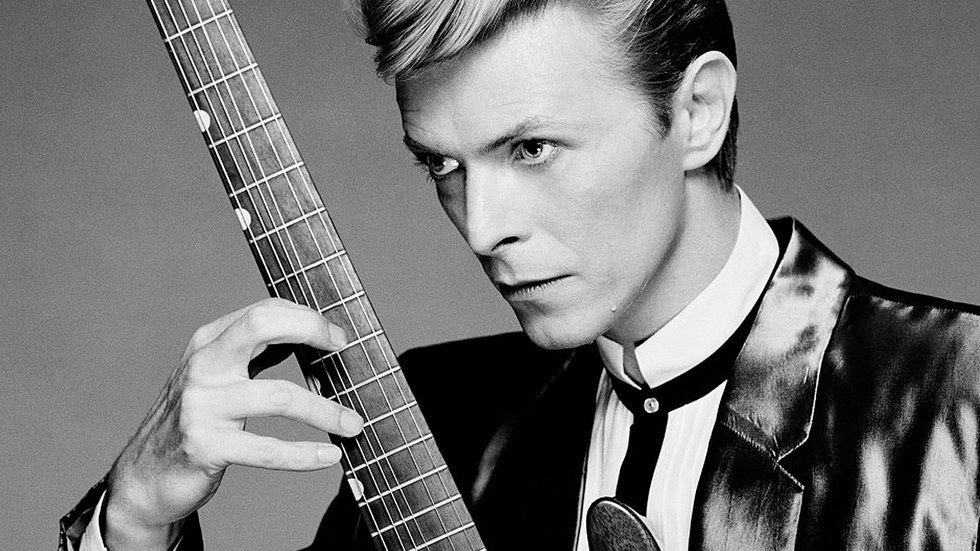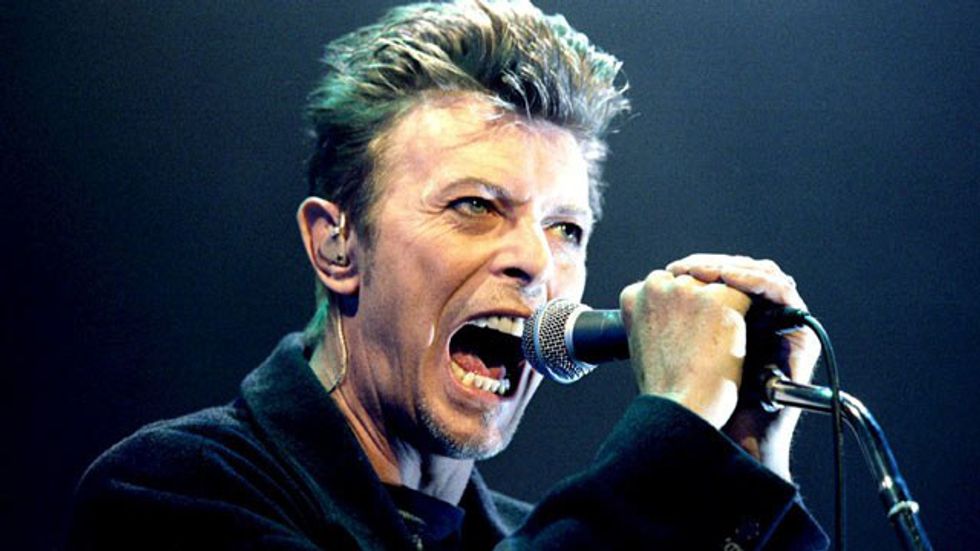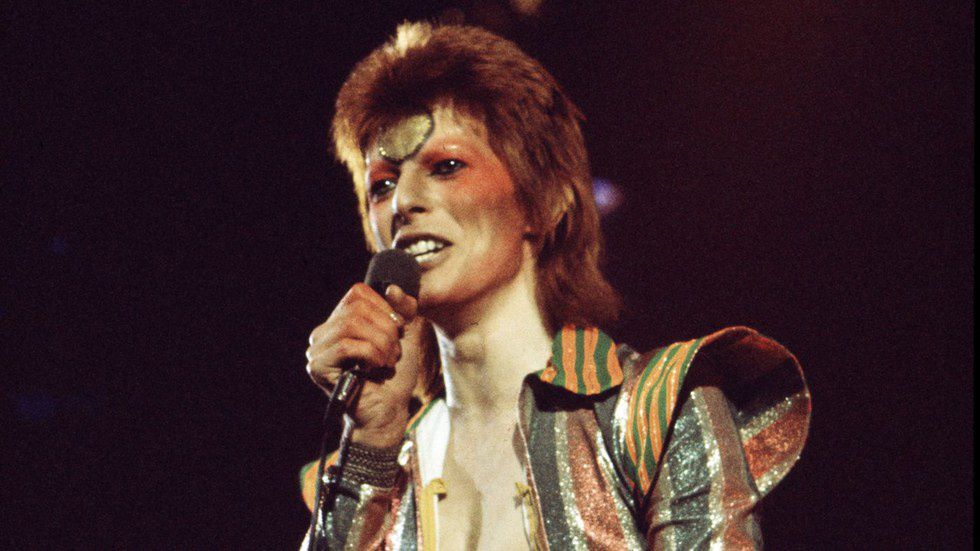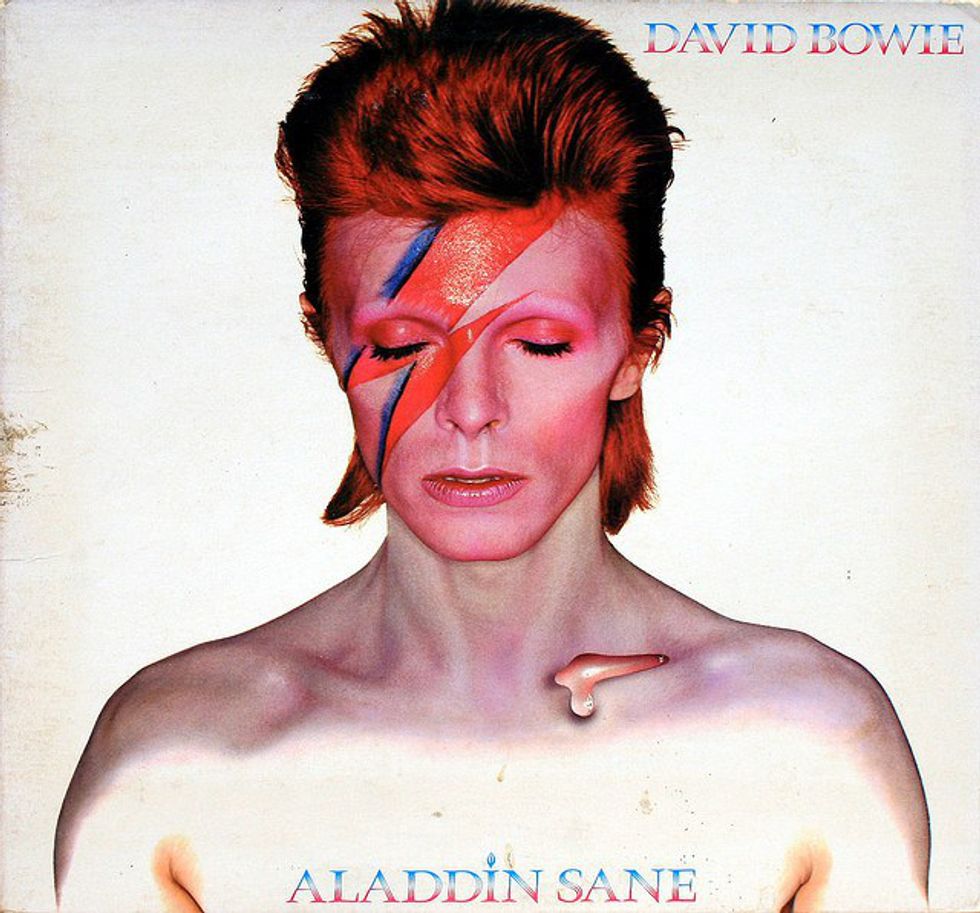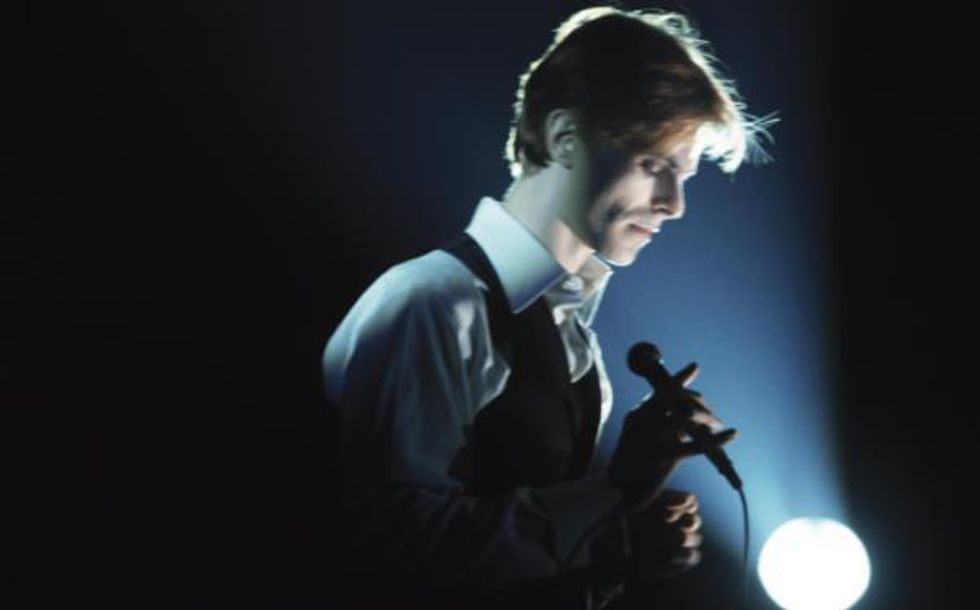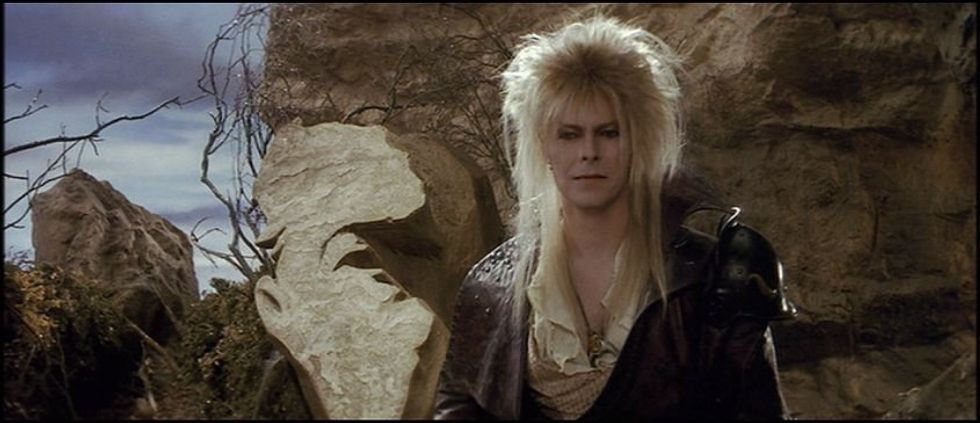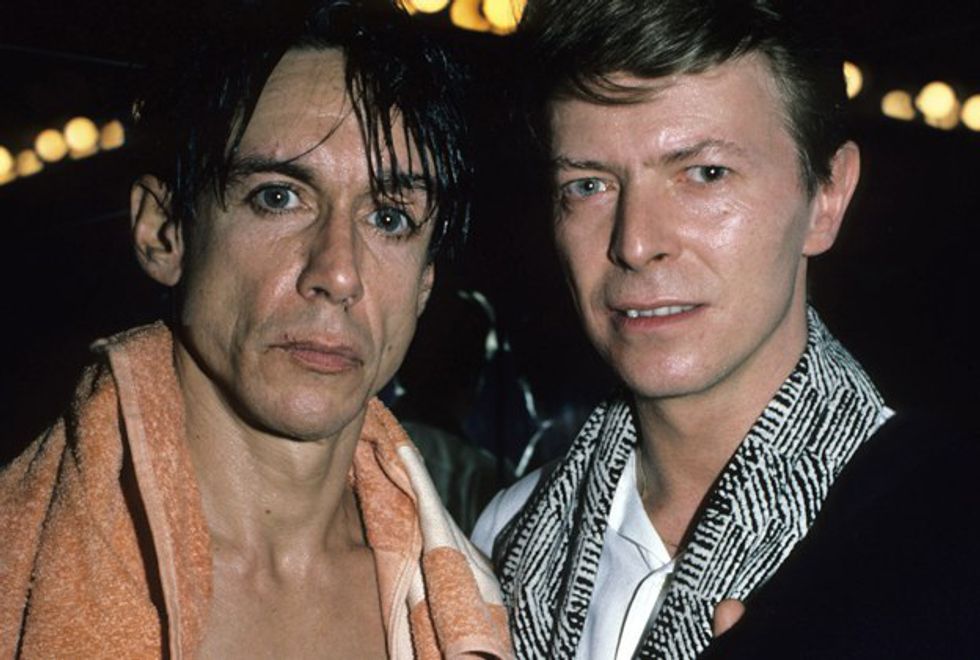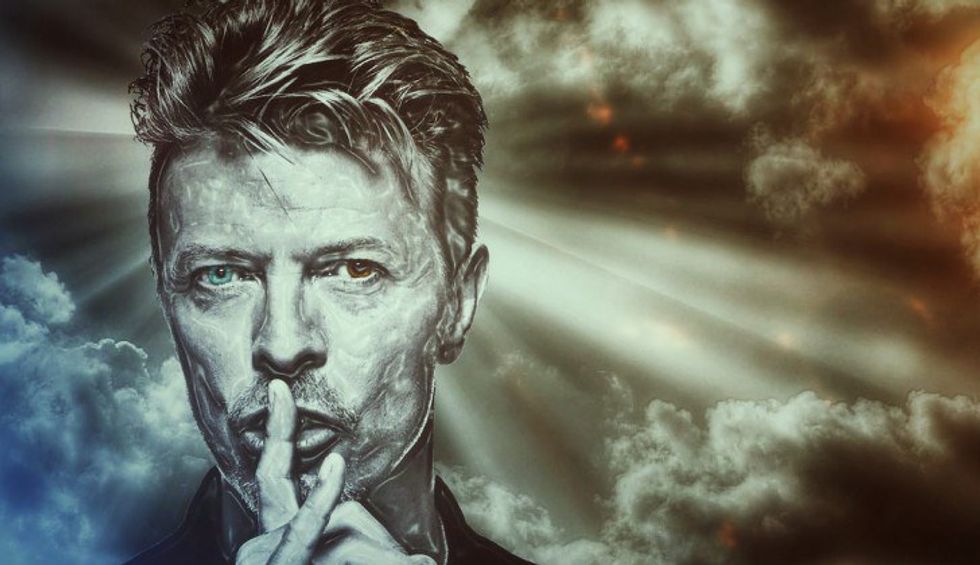A typical, slow Monday morning spent laying in bed. An occasion of acceptable sloth. Another daybreak gone by, the Sun circling through its cyclical pattern into midday. Huey Lewis and the News' "Back in Time" was a practiced alarm clock, sure to rouse me from my bed with excitement and thrill to begin my day, whose morning always began when it should have been ending. But, I was not thinking of playing music. My eyes fixed to the glow of my phone, I was scrolling through social media, ensuring I was knowledgeable enough on the status updates of my peers- as useful as pop culture references can be applying them to real life scenarios- and the latest headlines.
My thumb paused as my eyes read an article posted by the New York Times' Facebook account. One by one, I read the words of the article's title. And one by one, the singular meanings of the words came together, stringing out a heavier message whose weight stings even more when put together: "David." "Bowie." "Dies." "at." "69." The following sub-headline read "Star Transcended Music, Art and Fashion", a past tense praise for all of David Bowie's achievements.
“News guy wept when he told us Earth was really dying / Cried so much that his face was wet / Then I knew he was not lying”
-"Five Years"
Everyone seems to remember where they were the day their heroes died.
Such as politically driven figures of change including Martin Luther King, Jr., and John F. Kennedy whose flames were extinguished far too soon with violent gunfire. They had dreams to change the world we live in visibly, shifting society to a comfortable position for all to co-exist, not at the cost of assimilation but for the goal of peace. Speeches inspiring, re-empowering the people, reminding them they are the ones in charge of the world's re-envisionment. Textbooks tell their stories and immortalize them into our history. The people who make the world a better place.
Or the musicians, artists, thinkers, engineers of the human soul who disassemble themselves so we can put ourselves back together with them: John Lennon, Kurt Cobain, Jimi Hendrix, Jim Morrison, Lenny Bruce. Emotions, intangible puppeteers of our self, transformed into something physical, something beautiful, something that reminds them they are better than what they think they are. Memorialized not for their fame, money, or drugs, all assumed motivators to continue on the track of the fast lifestyle, but their ability to connect with us. Or rather, their inability to connect we all empathize with. Feelings take on forms of lyrics, melodies establish the mood and songs become the entirety of our life stories. They live on through emulation in memoriam of what they achieved and what imitators hope to achieve. The people who make us feel better while living in this world.
The ones relevant to our culture and we salvage from time, choosing them to be heroes. Though impossible to equivalently compare, both types unlock the power hidden within words to reach far into us, and leave a little bit of themselves within us, souvenirs we keep from encountering and being influenced by other people. These are the words we build ourselves off of.
I was encased in the sheets of my bed, void of inspiration to get up let alone create, wasting away the hours of an uneventful morning that is more than just being tired, which many do not admit to.
That was where I was learnt the death of David Bowie.
Sighing in a moment of inflection, I sat up and got dressed, not to the blues-pop soundtrack of Back to the Future, but to a musical composition by a man I knew nothing about, musically or personally. But, in the week to follow, after appreciating his music after educating myself on his discography, I would surely consider him one: "Heroes."
"Though nothing, will keep us together/ We could steal time, just for one day/ We can be heroes, forever and ever/ What'd you say?"
-"Heroes"
Rock star David Bowie was 69 years old when he passed away from liver cancer late Sunday evening, January 10, 2016. The word of his passing spread worldwide the next morning. He had been diagnosed with it 18 months ago. Bowie kept his ailment private between himself and those close to him. He wanted to see his fans on his own terms, in a manner they would expect out of him: turning his life, and even his death, into a work of art.
Bowie landed his first number one place on the U.S. Billboard's charts with his release of Blackstar, posthumously.
Bowie worked on and finished his final album Blackstar before his death. It was released two days before his death, itself a nod to his dwindling mortality and the impact he had on the music world. The music video of the title track depicts an alien world where a tailed woman finds the jewel encrusted skull in the remains of an astronaut suit, a decaying reference to Major Tom, the lost in space protagonist from Bowie's Space Oddity title track. Bowie plays several roles in the videos as "Button Eyes", a priest leading a cult ceremony worshiping Major Tom's skeleton, and a conscious narrator. In his neutral role, Bowie eulogizes himself:
"Something happened on the day he died/ Spirit rose a metre and stepped aside/ Somebody else took his place, and bravely cried/ (I'm a blackstar, I'm a blackstar)/ How many times does an angel fall? How many people lie instead of talking tall?/ He trod on sacred ground, he cried aloud into the crowd/ (I'm a blackstar, I'm a blackstar, I'm not a gangstar)"
Bowie, an angel or superior being looked up to by the generations of musicians coming after him, sees his death fast approaching. Months, weeks, days from the song's conception and recording. When his fans hear these words, they will know that their hero is not long for this Earth as well. Holes will be formed from this tragedy, only to be filled by the onslaughts of new music and artists inspired by Bowie. He hangs in the sky, a star standing among the constellations, not shooting as it would be long forgotten in that manner, burning black as cold as Death's grip. Eternally there for us to stare up at in wonder and say a White Dwarf star once shone there. We may still see it or hear it. But it is still gone. Its absence of warmth will be noticed. Most importantly, missed.
Two tracks later on Blackstar is "Lazarus", also the title to Bowie's off-Broadway play. Bowie narrates his passing:
"Look up here, I'm in Heaven/ I've got scars that can't be seen/ I've got drama that can't be stolen/ Everybody knows me now/..../This way or no way/ You know I'll be free/ Just like that bluebird/ Now, ain't that just like me?"
Lazarus refers to the Biblical miracle of resurrection. Bowie, as "Button Eyes", lies on his death bed. Soon, Bowie would be free from his pain and his existence, rising back up again in a different form, let it be metaphorical torches being passed on to new musicians through words or a literal example of reincarnation. The real Bowie in the video shakes uncontrollably at his desk as he tries to gather all his energy to jot down his last thoughts, the lyrics of the song. He sees the camera and viewer off at the end as he shudders backwards into the closet, away from us.
The seventh and final track on David Bowie's 27th and final studio album is "I Can't Give Everything Away." In the second verse and outro chorus, Bowie sings:
"Seeing more and feeling less/ Saying no but meaning yes/ This is all I ever meant/ That's the message that I sent/.../ I can't give everything/ I can't give everything/ Away..."
The battle with cancer has taken its toll on the aged rock star. He has gained an introspection on himself, life, and the meaning behind his music and previous works. He wants to give us so much more, the promises he still believes he owes to us. More music, more emotions, more opportunities to connect, more love to all living creatures of Earth (or Mars). But he just cannot. He hangs onto the last line, drifting away from us, tuning out.
He looks towards something greater than him, an experience separate for us all. Just like Major Tom, he floats off into the unknown, leaving behind the wealth he could give to us: his time, his music, everything he could hope to create, everything created inspired by him. He returns to whatever planet he claims to be from, his mission of enlightening the people of Earth having been fulfilled. He leaves behind his songs, vocal postcards we cherish from the afternoon daydreams and long car rides. He cannot give us anything more than his music, following the theme that Blackstar is his sendoff to all his admirers. He can't give them his personal life, but at the same time, he shares his death with all of us.
The last song ever spun by the leader of the Spiders From Mars is five minutes and 47 seconds in length. The album is over. Your laptop speakers go silent. The disc is ejected from the car radio. The record slows down as the needle is re-positioned. No more songs to sing. Physically, David Bowie is gone. Spiritually, we have proof of his existence.
" God knows I'm good/ God knows I'm good/ God knows I'm good/ Surely God won't look/ The other way"
- "God Knows I'm Good"
Bowie's styling, fashion, and image has changed sporadically over the span of his fifty year career. His advice to others from "Changes" from his fourth album Hunky Dory seemed to be his personal motto: "Ch-ch-ch-ch-changes/ (Turn and face the strange)/.../Time may change me/ But you can't trace time." And we loved him for it. A iconic butterfly, we witnessed Bowie's metamorphosis as he experimented with sound and vision, or at least our perception of him
In his first album, self titled David Bowie, he was just starting out as a poppish folk singer. Cheery rhymes covered Bowie's dark wits accompanied by older instruments and waltz-style sounds. He was just 20 years.
In his second album, Space Oddity, he made the transition to more serious stream of consciousness style of music. Lead acoustics blazed the path for psychedelic imagery and tones. The album was more of an embarkment on a long awaited journey he looked forward to being lost in, rather than a transition from where he already was. It also marks guitarist Mick Ronson joining Bowie's support band. Major Tom lifted off, and soared into boundless space, unrestrained by no man's limitations. He was 22 years old.
In his third album, The Man Who Sold the World, David Bowie made sure to leave his signature on the uprising rock underground, leaving a tip for incentive to evoke only the best of musicians at the time. Critics label Bowie's sixth album to when his first album released as an official rock star. If it were not for his bona fide status later on, The Man Who Sold the World is most definitely Bowie's first real rock'n'roll album. Right from the start, "The Width of a Circle" storms out hard. Mick Ronson leads the assault, barraging the ears with a rhapsody of guitar solos, wailing away to fine tune the harsh sound of early 1970's rock. It was only a year later. He was 23 years old. Boldly, David Bowie crowned himself.
And since then, the story of his success practically writes itself. Bowie transmitted his otherworldly ambition in his, each album possessing its own sound, all credible emulations of varying genres of music, from heavy metal and glam rock to pop and punk.
The epitome of an icon, Bowie's commanding presence was not limited to something you could just listen to. His assortment of personas, characters emerging from the aesthetics of his concept albums, demanded flamboyant and extravagant wardrobes to accommodate the level of artistry Bowie wished to achieve. Just as every album had a distinct sound, every album came with a distinct character or imagery as well. Bowie transformed into the rainbow shaded alter egos he developed.
As if a snake shedding skin, Bowie would re-emerge from a psychological cocoon time and time again, to be reborn continuously as his id took over his ego complex where it artistically saw fit. Among these changing faces of David Bowie, there was:
Ziggy Stardust and the Spiders From Mars from Bowie's fifth studio album (The Rise and Fall of Ziggy Stardust and the Spiders from Mars). Ziggy Stardust was an alien in the body of a human, a rock star whose music is used to deliver messages between sentient lifeforms across the cosmos. Bowie's sexual fluidity and social commentary on sexuality began with Ziggy Stardust, the character's dress and use of makeup and dyed hair denoting a female appearance to the rocker's androgynous body type. The Spiders From Mars was the name for Bowie's band, led by guitarist Mick Ronson.
Aladdin Sane the titular character from Bowie's sixth studio album. It is a playoff of the phrase "a lad insane." Bowie's portrayal of these characters were supposed to connote a split between his dominant personality- David Bowie- and these other ones, in this Aladdin Sane. For this, Sane's face was emblazoned with a colorful lightning bolt down the center of his face, an uneven balance akin to the differing dilation of his eyes causing his multi-colored irises stemming from a youth scuffle. A continuation of the Ziggy personality, Sane is supposed to represent Ziggy's observations of America, following the trend of bizarre wardrobes.
The ghastly pale Thin White Duke from Bowie's tenth studio album (Station to Station). Nearly vampiric in appearance with the snow white complexion and casual shirt-vest combination. The Duke appeared when Bowie was at his most manic, most deranged, most lost state. As white as the drugs he indulged and as elitist as the royal title the character accessorized, Bowie baffled the media when he made statements supporting fascism while addicted to cocaine. This was during a time when musicians' involvement in political matters heated up; Bowie's own blunders were compared with an incredibly nationalistic and racist speech Eric Clapton made during a concert.
Living off a diet of only peppers and milk, there was a reason the White Duke was thin. But none of it was true to David Bowie: he was playing with dangerous ideologies while blinded by drugs. The character is a parallel to Roger Waters' character Pink Floyd in the band's The Wall, mirroring dictators only for satire's sake. Bowie's personas are not to be mistaken for his original identity, it is all apart of the act. In reality, Bowie even called MTV out during an interview for not showing enough African-American artists on the network in the 1980's.
And, more well known in cult classic circles, Jareth, the Goblin King from Jim Henson's 1986 live-action film Labyrinth. Judging by Jareth's appearance, he is a parody of a hair metal or glam rock musician, exactly like Bowie. Bowie has a penchant for playing larger than life, almost mystical characters in film. In The Man Who Fell to Earth (1976), Bowie played the protagonist, a humanoid alien going by the name of Thomas Jerome Newton; the film was produced during the time period Bowie became the Thin White Duke and the character of Newton is credited as being based off that phase of Bowie. Bowie portrayed Pontius Pillate in The Last Temptation of Jesus Christ (1988) opposite of actor Willem Dafoe as Jesus, electric energy pioneer Nikola Tesla in The Prestige (2006) also starring Hugh Jackman and Christian Bale, and even himself in Zoolander 2001).
And the best David Bowie personality, out of all of them, is "David Bowie." The artist's birth name is David Jones, changed so as not to be confused with Monkees member Davy Jones. The David Bowie construct is not a deception of what we have seen or listened to the last half century. It is an exaggeration of a man that already exists, a man we cannot normally imagine incapable of switching the sea with the sky through song or being born of a red lightning bolt lost in a tornado. As Aladdin Sane's facial design indicates, we cannot tear the face from fiction. Bowie's son is director Duncan Jones, known for Moon and Source Code. And he just called him "dad."
"Strange fascination, fascinating me/ Changes are taking the pace/ I'm going through/ Ch-ch-ch-ch-Changes"
-"Changes"
Collaborator, band member and friend Iggy Pop gave Bowie credit for revitalizing his career in an interview with the New York Times: "He resurrected me...He was more of a benefactor than a friend in a way most people think of friendship. He went a bit out of his way to bestow some good karma on me.”
But to say Bowie only inspired musicians would not be entirely the truth.
Fight Club author Chuck Palahniuk remembers Bowie's music in a Rolling Stones article, something he always enjoyed and admired, for clearing a room by playing "Young Americans" 40 times on a jukebox so he could speak to a publisher and sell his novels, one of which was Fight Club. Bowie literally started Palanhiuk's career! Comedian Ricky Gervais stated to the Hollywood Reporter," I never forgot he was my hero, even when he became my friend," recalling the few times he got to work with Bowie, even having him write a song titled "Chubby Little Loser" directed at Gervais' character on his sitcom Extras.
Creators of Adult Swim's series The Venture Bros. Doc Hammer and Jackson Publick sat down in an interview with SPINOFF to express their grief over the loss of David Bowie. Probably unbeknownst to Bowie, the two animators made him a character in their cartoon series, as the shape shifting Sovereign of the Guild of Calamitous, a Legion of Doom-esque temp agency that sets super villains with arch-nemeses. David Bowie is the shapeless character's default form; in one episode, Bowie was even betrayed by collaborators and band members Iggy Pop and Klaus Nomi. The animated series is full of David Bowie references.
In a Rolling Stones response, former Soundgarden leader Chris Cornell wrote how the words from "Lady Stardust" emotionally pinged with and comforted him after Soundgarden broke up. In the past few months, quite a number of bands have been broken up. Sadly, permanently fractured by the loss of a group member: Stone Temple Pilot's Scott Weiland, Motorhead's Lenny Kilmister, and, now, the Eagles' Glenn Frey. Despite the lyrics below being an attack against Bowie's plateauing friendly rival Marc Balon, hopefully all these other musical powerhouses can find the same ironic comfort Cornell found that gave him closure on his situation.
"And he was alright, the band was altogether/ Yes he was alright, the song went on forever"
- "Lady Stardust"
Even after his death, we rejoice in Bowie's company through his art, music and words. We fan through his many incarnations of sound and visuals. Every projection of himself now a puzzle of how such genius originated from the same eclectic influences. Years from now, when the dust swallows the aging records sitting in the corner of the basement, the myth of David Bowie will be retold endlessly. And if not of him, then the legend of Ziggy Stardust or Aladdin Sane from Mars or the Thin White Duke from the very large and dark corner of the mind will replace his leading role.
Another Legend tallied as a casualty by the fast moving hands of Time...
Another Great whose best chapter is to be bookmarked for the next reader...
Another One who has outlived life's pace for greatness...
But, in the middle of the rubble of cliches, unable to do the phrase justice without the right dramatic magnitude, there was, is, and will forever be only one David Bowie.






